|
|
|
Sort Order |
|
|
|
Items / Page
|
|
|
|
|
|
|
| Srl | Item |
| 1 |
ID:
192893
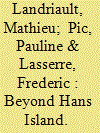

|
|
|
|
|
| Summary/Abstract |
The governments of Canada and Denmark signed a historic agreement on Hans Island on 14 June 2022. Although most of the agreement was devoted to the resolution of the Hans Island dispute, it also settled other issues. We argue that provisions on mobility and the continental shelf in the Labrador Sea give rise to interesting precedents that could have far-reaching effects for northerners. The agreement on enhanced mobility could represent a first step in a more ambitious process of facilitating Inuit mobility across Nunavut and Greenland, while the settlement on the continental shelf illustrates how states could collaborate on other continental shelf cases, including the continental shelf in the Central Arctic Ocean.
|
|
|
|
|
|
|
|
|
|
|
|
|
|
|
|
| 2 |
ID:
072795


|
|
|
|
|
| Publication |
2005.
|
| Summary/Abstract |
Denmark appeared to be caught in several difficult political dilemmas when the United States government indicated its desire to upgrade facilities at Thule Air Base in Greenland for a role in missile defence. Domestic politics and constitutional relations between Greenland and Denmark were at the heart of the problem. Would a 'Yes' to the American request inflame the movement for independence in Greenland? Would a 'No' leave Denmark, which had earlier opted out of EU defence cooperation, without strong allies? And would a democratic debate on the issue jeopardize a government policy in favour of 'Yes'? After years of consultations, debate and negotiations, approval from both the Greenland government and the Danish Parliament was obtained. Rather than being resolved, the dilemmas were bypassed. The strategic and military issues of missile defence were overshadowed when Greenland used the occasion to take one more step towards independence. In Denmark the remoteness of Thule and a sense that supreme interests are at stake limit public debate.
|
|
|
|
|
|
|
|
|
|
|
|
|
|
|
|
| 3 |
ID:
129443
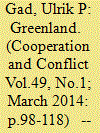

|
|
|
|
|
| Publication |
2014.
|
| Summary/Abstract |
The relationship between Greenland and the European Union (EU) can best be understood by exploring the development from Danish colonialism to a future independent Greenlandic state. In 1985, Greenland became the first territory ever to leave the European Economic Community (EEC) when it opted for status as an 'overseas country or territory'. The manner in which Greenland had to follow Denmark into the EEC in 1973 - whereby Greenlanders saw control over their fisheries move from distant Copenhagen to even-more-distant Brussels - was pivotal for the Greenlandic demands for home rule that succeeded in 1979 and made the 1985 withdrawal possible. On 25 November 2008, a majority of the people of Greenland voted in favour of enhanced home rule - 'self-government' - still within formal Danish sovereignty. Denmark and Greenland alike are preparing for a future envisioned as involving climate change, intensive raw material extraction, new transportation corridors and new claims to sovereignty over the Arctic. Greenland uses this imagined future as a way of enhancing its subjectivity, not the least when dealing with the EU. This article analyses how the Greenlandic self-understanding as being on the way to sovereignty - and the tensions involved - structures the triangular relationship between the EU, Greenland and Denmark. The article concludes that the visions of sovereign equality might, on the one hand, create greater expectations than Greenland will immediately be able to live up to - at home and in the EU. On the other hand, the representation of the Greenland-EU relationship as one of sovereign equality - present and future - might just be able to provoke the resources necessary to make the dream come true.
|
|
|
|
|
|
|
|
|
|
|
|
|
|
|
|
| 4 |
ID:
173740
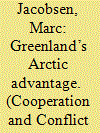

|
|
|
|
|
| Summary/Abstract |
Greenland representatives successfully use the renewed international geostrategic interest in the Arctic to enhance Greenland’s foreign policy sovereignty. This is facilitated by Denmark’s dependence on Greenland’s geographic location and continuous membership of the Danish Realm for maintaining the status of an Arctic state, which recently has become one of the five most important security and foreign policy priorities. The dependency gives Greenland an ‘Arctic advantage’ in negotiations with Denmark, while turning circumpolar events into strategic arenas for sovereignty games in the aim to move the boundary of what Greenland may do internationally without Danish involvement. This article analyzes how these games unfold in the Arctic Council, at the high-level Ilulissat meetings and at circumpolar conferences where Greenland representatives articulate, act and appear more foreign policy sovereignty through outspoken discontent, tacit gestures and symbolic alterations. Altogether, this contributes to the expanding of Greenland’s foreign policy room for maneuver within the current legal frameworks, while enhancing Greenland’s international status and attracting external investments, important in their striving towards becoming a state with full formal Westphalian sovereignty.
|
|
|
|
|
|
|
|
|
|
|
|
|
|
|
|
| 5 |
ID:
183126
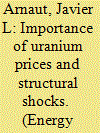

|
|
|
|
|
| Summary/Abstract |
Over the past decade, Greenland has lifted and restored its ban on uranium mining amid the uncertainty of global uranium prices. This article investigates the dynamic interrelations between uranium commodity prices and the impacts of structural shocks, sketching key economic implications for Greenland. Using a structural vector autoregressive model, this work analyses the changing relations between uranium prices, coal prices as well as real and financial variables from 1980 to 2019. The main findings are that the dynamics of uranium spot prices are diversely affected by shocks in combined real GDP, total electricity production from nuclear power, the interest rate, the real effective exchange rate, and the price of coal. The estimates also show that the pricing dynamics are important for future production and capital investment decisions. The analysis illustrates that despite the prevailing depressed uranium market, Greenland can still capitalize on future market developments. The country can anticipate benefiting from a short-run world supply disruption, a positive combination of macroeconomic shocks, and the long-term expansion of nuclear energy programs.
|
|
|
|
|
|
|
|
|
|
|
|
|
|
|
|
| 6 |
ID:
119864
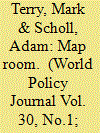

|
|
|
|
|
| Publication |
2013.
|
| Summary/Abstract |
Prince of Wales Strait, Northwest Territories-A century ago, traversing the Northwest Passage was a grueling effort that often took years. Explorers frequently perished as their boats sunk or got trapped in the abundant pack ice. Today, these waters are mostly ice-free during the summer, and ships can sail through with ease.
|
|
|
|
|
|
|
|
|
|
|
|
|
|
|
|
|
|
|
|
|